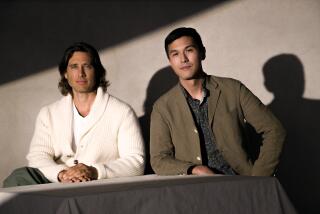Chinese who first glimpsed American culture through Alan Thicke mourn his death

Reporting from BEIJING — A certain generation of Chinese remember Hollywood actor Alan Thicke as the man who taught them about psychiatrists and shoulder pads.
His sudden death this week saddened many across the nation who first encountered America through the celebrity and his persona as a befuddled, loving father.
“Growing Pains,” the three-decade-old family sitcom starring Thicke, gave millions of Chinese their initial taste of American culture as the country emerged from decades of isolation and began to engage with the world.
The series aired in China for four years starting in 1990, one of the first U.S. TV shows dubbed in Chinese and available to a wide audience. Countless young Americans watched Thicke’s Jason Seaver, a psychiatrist and stay-at-home dad, debate bad grades and teenage relationships with his children. But it resonated differently in a newly opened China, a reminder even today of U.S. entertainment’s global influence.
“It was all very exotic to me,” said Li Jinglin, 37, a Beijing office clerk who watched the show every week with her parents. Her father liked to view it in silence and banned anyone from crunching on sunflower seeds. Afterward, she and her dad would mimic lines from the show about cleaning the house.
“I learned how different the U.S. was then,” Li said, “but I also learned how similar Americans were to us.”
Viewers couldn’t believe young couples openly dated or that a family would raise three — and later, four — children. (China for decades forbade families from having more than one child, a policy the government relaxed last year.)
But the show also conveyed a universality that made the United States appear a little less foreign.
“People at that time expected stories on TV shows to be staged,” said Li Xun, a research fellow at the China Film Art Research Center. “Although this show was from the other side of the world, ordinary Chinese people could relate to it.”
Chinese parents handled child-rearing differently, he said, but it still reinforced “what happened to them could happen to us.”
State media announced Thicke’s death Tuesday at age 69 on social media accounts and received a deluge of responses. “Can’t stop crying,” one person said. Another wrote: “Dad has passed away.”
The actor, originally from Canada, suffered a heart attack while playing ice hockey with one of his sons, Carter, in Burbank. His loss hit a nerve in a country that has shifted its adoration to Korean soap operas and Japanese anime.
“Those stories of the Seaver family are my childhood’s best memories,” someone wrote on Weibo, China’s version of Twitter. “My sincere condolences to Uncle Jason.”
The series became a lesson in fashion and relationships. Girls started wearing pink hair bands. Family members questioned whether they interacted enough with each other.
“I have to say this show has changed my values,” said one person on Zhihu, a question-and-answer site. “The home on the show is what I believe a home should be.”
The real-life characters may not have lived up to that ideal. But for many Chinese who viewed Thicke’s death with a touch of nostalgia, that wasn’t the point.
“I just realized how much has changed in my life,” said Zhang Weiwei, 40, an accountant in Beijing who can still recite the show’s theme song. “That was one of the happiest moments when I was a child.”
Meyers is a special correspondent. Nicole Liu in the Times’ Beijing bureau contributed to this report.
More to Read
Sign up for Essential California
The most important California stories and recommendations in your inbox every morning.
You may occasionally receive promotional content from the Los Angeles Times.









